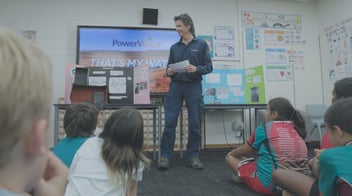Students showcase solutions for water savings
A school education program in the Northern Territory (NT) has taught thousands of kids about the importance of saving water and led to reductions in water use.
‘That’s My Water!’ is a four-week curriculum unit developed by Power and Water Corporation, the NT Department of Education, the Bureau of Meteorology, Charles Darwin University and local schools.
It draws on draws on science, technology, engineering and maths (STEM) to educate kids about water consumption in the Darwin region, including water evaporation and different water sources.
This year’s program culminated in showcases at Dripstone Middle School and MacKillop Catholic College, where more than 350 year-seven students unveiled their innovative solutions to influence water consumption. These ranged from scientific models to videos, posters and even board games.
The unit is part of Power and Water’s Living Water Smart program, which was developed to encourage NT residents to save water.
Living Water Smart Program Manager Jethro Laidlaw said ‘That’s My Water!’ is about empowering children to encourage others to be water efficient and to understand water supply issues.
“After the poor wet season, having hands-on experience helps students better understand the importance of living water smart,” Laidlaw said.
“Hopefully they’ll pass on their knowledge and create generational change about water conservation.”
Over the past four years, the program has reached more than 2500 students across the NT, including 75% of Darwin primary schools.
It has had a tangible impact, with two-thirds of participating students saying they now take shorter showers, and one-third of families saying they have found and fixed a water leak.
Dripstone Middle School Principal Robyn Thorpe said the project gave students the opportunity to work on a real problem with the support of industry experts.
“Students today want to learn in real-life contexts that have relevance, meaning and purpose,” Thorpe said.
“This enquiry approach to learning moves away from teaching subjects in isolation to a more diverse way of learning across subjects, including STEM.”




